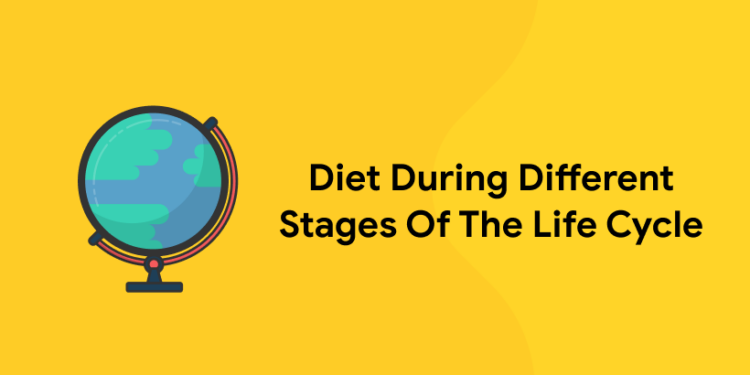Table of Contents
The National Academy of Sciences has published recommendations for Dietary Reference Intakes (DRIs) that are specific for the various stages of life. It should be noted, that the DRIs apply only to healthy people and are not recommended for individuals who are either chronically not well or who are at high risk for illness due to age, genetics, or lifestyle factors.
Diets In Different Stages Of Life Cycle
Our nutritional needs change with different life stages. To be fit and healthy, it is important to take into account the extra demands placed on your body by these changes.
Infants
Infants usually double their length and triple their weight from birth till one year of age. Breastmilk generally supplies a baby with the required amounts of nutrients, fluids and energy up to about six months of age. For the first six months of a baby’s life, the Department of Health recommends that mothers breastfeed their babies as breast milk is full of nutrients and antibodies that infants need. Breastfeeding might not be for everyone, so bottle feeding formula milk offers a great alternative. Typically, cow’s-milk-based formulas are recommended. But if you are unsure about which formula to give your baby, a nutritionist or midwife will be able to advise you.
Solids should be introduced around six months of age to meet your baby’s increasing nutritional and developmental needs. However, breastfeeding should continue until twelve months of age and beyond, or for as long as the mother and child desire.
Pre school and school going children
Once the kids started to eat solid foods, offer a wide range of foods to ensure adequate nutrition. Young children are often choosy with food, but should be encouraged to eat a wide variety of foods. Trying again with new foods may be needed for a child to accept that food. As many as eight to fifteen times may be needed.
During childhood, children tend to vary their food intake (spontaneously) to match their growth patterns. Children’s food needs vary widely, depending on their growth and their level of physical activity. Like energy needs, a child’s needs for protein, vitamins and minerals increase with age.
Key food groups to incorporate in a pre-school child’s diet include carbohydrates, fruit and vegetables, milk and dairy foods, protein and good quality fats. Ensuring the child has a balanced diet containing the essential food groups and nutrients – vitamin A, C, calcium, iron and zinc – can be difficult if your child is a fussy eater.
Prepare For Various Govt Exams – Download Entri App !
Nutritional Diet Tips for preschool or school going children:
- Offer fruit and vegetables at every opportunity starting with breakfast.
- Try introducing healthy, yet tasty smoothies into your child’s diet if they don’t like eating fruit and vegetables from a plate.
- Hiding vegetables in foods such as Bolognese and other pasta sauces is a good way of providing the recommended five a day without realising.
- Sometimes children can become sick of a particular food. So if they love apples then refrain from overfeeding them.
- Keep offering new foods; it can take them up to 20 times of tasting something to like it.
Adults
The majority of our body’s growth and development will be over when we enter adulthood. We can now shift our focus on nutrition and maintaining a physically active and healthy lifestyle. This will help reduce the risk of weight, age and lifestyle-related diseases. The growth spurt as children move into adolescence needs plenty of kilojoules and nutrients. For girls, this generally occurs around 10 to 11 years of age. For boys, it occurs later, at around 12 to 13 years.
Young Adults
Due to the accelerated growth period a teenager goes through, they need a balanced diet packed full of nutrients including calcium, iron and protein. You may want to consider a vitamin and mineral supplement designed specifically for teenagers. This will ensure they are getting these essential nutrients. At the young age people starts moving away from home, starting work or study, and the changing lifestyle that accompanies the late teens and early 20s can cause dietary changes that are not always beneficial for good health. Nutrients recommendations depend upon lifestyle and physical activity.
Old Age
During old age Physical activity is not much encouraged, hence carbohydrates and fats need to be restricted. But there is muscle loss and fragility of bones is common, hence protein is required to make up for the loss and for maintaining growth of cells. It is important to focus on good nutrition for the elderly as our bodies’ change and face a number of limitations when we grow older. With reduced mobility to get to the shops to buy ingredients for balanced meals, and other social aspects like a lower food budget, single elderly people may lose the motivation to cook balanced meals or even lack the cooking skills to complete such tasks. Freezing food, snacking and purchasing long-life foods all can be great ways to introduce and maintain the dietary requirements and nutritional needs of an older adult or elderly person. Since teeth start falling off hence chewing becomes difficult and thus milk is a good option for old people. While cooking large meals, dividing them into equal portions and then freezing them will enable you to have a number of cooking-free days and give you the nutrients and minerals you need to stay healthy.
Need Of Food
1: Who was the first woman President of India?
Why we need food? Food is one of the basic component of everyone’s life. Without food no one can exist in the world for long time. Food provides all the basic vital nutrients like proteins, vitamins, carbohydrates, fats, and minerals to our body. All nutrients provide energy to our body when our body gets the energy to metabolism in our body and our body functions properly. Having food gives our body essential nutrients to grow and heal when we are injured or ill. The main sources of food we eat are from plants and animals. Food from plants are leafy vegetables, fruits, parts of plants like stem and roots and food from animals are Milk, egg, meat, chicken, fish, prawn, beef, pork etc. To maintain a healthy and fit body we need to have several essential food types. The essential food types that our body needs are carbohydrates, proteins, fats, vitamins.
Attempt Free General Knowledge Mock test! Download Entri App!
Importance Of Food
All living things need to eat, though what they eat differs depends on income, culture, access, and personal preferences. Similar to a machine, a body also needs fuel for it to work – food is the fuel for our body, as it provides energy for us. The food also provides us with amino acids – which help us with digestion. The world has plenty of food to offer us – it is up to us what we want to eat or not. We know how food is important for us to developing our muscles, growth, body, mental health, etc. Therefore, we should never ever avoid the importance of food.
- Food helps in building our immune system stronger.
- A strong immune system helps to fight diseases.
- Food provides us with several nutrients like vitamins, carbohydrates, proteins, minerals, etc.
- These different components of food serve different functions. For example, proteins help in maintaining normal body weight.
- Food provides us energy through the breakdown of glucose. It makes us feel active throughout the day.
- Food helps in repairing damaged cells.
- Food balances the hormones in our bodies.
- Healthy foods like spinach, lemon, etc. may help to increase our metabolism.
- Food maintains the proper growth of our bodies.
- Our favourite foods can also help in relieving our mental stress.
Adequate Nutrition
Adequate nutritional diet is one of the most important contributing factors to achieving or maintaining a good condition of health. A healthy diet means different things to different people. In children’s nutrition, an adequate diet aims to promote healthy growth and development. In adult nutrition, it focuses on attaining or maintaining optimal health and preventing chronic degenerative diseases of complex causation. Proper intake of food provides adequate energy, builds new tissue, repairs worn-out tissue, and keeps the body working well. Generally, a balanced diet contains adequate proportions of carbohydrates, fats, and proteins, along with the recommended daily allowances of all essential vitamins, minerals, and health-promoting substances. It is recommended that complex carbohydrates of at least 50% of the diet make up the major part of energy intake; 25% to 30% of energy should be derived from fat, and 10% to 15% from protein. Energy needs and nutrient requirements, however, differs widely.
Grab Latest GK Study Materials! Register Here!
Basic food forms of adequate diets are mainly from plant. Carbohydrate-rich foods such as cereals should be supplemented with foods particularly rich in vitamins A and C, minerals, and protein such as vegetables, fruits, and legumes. Foods of animal origin, particularly meat and fish are not essential for an adequate diet, but they are a useful complement to most diets. Societies that have adopted vegetarian diets do not show evidence of malnutrition when the supply of total food is adequate. They rather have a lower risk of nutrition-related diseases such as obesity, diabetes, hypertension, certain cancers and coronary heart disease. A sufficient fluid intake is important to an adequate diet. Breastmilk is the most adequate diet for children up to six months of age. A major problem in all societies is the consumption of a monotonous diet. A prolonged consumption of an inadequate
diet is likely to lead to malnutrition, overnutrition or undernutrition, and degenerative diseases.
I hope you found this article useful. The secret to clearing an exam is to prepare methodically and strategically. If you’re a candidate looking to start your dream job but don’t know where to start, our Entri app has you covered. Our staff will provide you with content and insights on the topics that affect you. Become a member of our app today and enroll in one of the many programs available. Stay up to date on various elements of the subject you’re interested in by using the app. Please feel free to leave any questions or concerns in the comments area. We will make every effort to reach back. Remove any self-doubts and negative thoughts from your mind. Make an effort to maintain a clear viewpoint. Consider why you desire this. Concentrate on the positive aspects of your situation and work diligently. Each day is a valuable gift that has been placed upon us, so make the most of it. Make an effort to improve yourself. Today is the day; let’s hope it goes well. Best wishes.














